At least there would not be evidence of me in that camp.
I was glad of all the time I spent outside the little house in the woods sharpening my vision as I ran through the night. I could move much faster on my own than we had moved on the way down, and moving, trying to avoid breaking my ankles or running into trees, gave me something to think about other than the sounds of Semchik’s bones crunching or the smell of his blood permeating the air.
If I showed up on Aksana’s doorstep with the boy she had raised me to protect dead under the open sky behind me—
Well, that wasn’t worth thinking about. Semchik would be fine. He could beat Filipp Artyomovich when we were children; he could beat Filipp Artyomovich now.
The sun had been up and in my eyes for over an hour by the time I hit the outskirts of Whitecap. The roads here were well traveled, and I couldn’t keep running without being noticed, without running over some unsuspecting pedestrian, but I couldn’t slow down, either.
At the gates, I struggled to find papers that weren’t there, sweating and fumbling over the disgusting boot in the mostly empty pack Semchik had shoved in my arms. I hadn’t thought this through, but when the guards saw me, they exchanged looks and passed a whispered message back through the ranks.
That could have meant many things, one of which being that they recognized me and I was about to be arrested or killed on the spot, but I thought if that were the case it would have happened already. No, it made me breathe a little easier, in fact, because I thought what it meant was that Semchik had gotten that message to Aksana, and if he’d gotten a message to Aksana, it meant that he was alive to send messages.
In any case, the guards pulled me aside, and I let them, and I sat quietly inside the gate house twisting my hands in my lap and trying to catch my breath while they stared glassy-eyed at me. In half an hour a carriage arrived. Two volshebnik guards weighed down the runners and two more waited for me inside.
I wondered what Semchik could have said in his message to explain this.
Last time I saw Aksana, she gave me a knife to kill myself. She stroked my mottled head. She let me be her son and she told me she would have killed me quickly.
The carriage stopped after what felt like hours trundling through traffic. Several times I thought about getting out and running the rest of the way to the palace, but every time I so much as twitched, the volshebnik guards raised their hands off their laps, just enough to still me. (I didn’t recognize them. They probably were children when I died.)
When we stopped, the weight on the runners lifted, and the door swung open, and there it was: Whitecap Palace under the glowing coastal sun. We were as close as the carriage could get, before the ground fell away and the boardwalks rose up over the swamp. Up ahead the great hall towered, white and resplendent in the sunshine.
The volshebniks outside held the door open for me. No one touched me, not a finger laid on me, not even a breath on my skin. Their eyes slid over my face like it was ice, but they flanked me, and they led me up to the great hall.
When we drew closer, two smudges appeared on either side of the dark palace doorways. Otherwise, the grounds were quiet, like they’d been emptied out.
The smudges gained form as we approached, the details of clothing and faces making themselves known, and there stood Nestor and Agafya.
It felt surreal seeing them. They looked at me a beat longer than anyone else did, their faces—their faces, the same faces I remembered from my childhood—drained of color. How could things still be so much the same? So much the same except there was no eye rolling or beleaguered sighs from them now, and that was quite the difference, wasn’t it? This was not how this was supposed to go, was it?
They opened the doors. No one made me wait this time.
I half hoped to see Reskov on the other side of them, but the antechamber was empty. Reskov, how old had he been? My stomach dropped. Reskov was a miryanin. Would they have made him young, too? They had to, didn’t they? Aksana could barely even get up in the morning without Reskov.
Our footsteps on the floor punctuated the pristine silence.
I was so tired that when Agafya opened the interior door—peering in first, like a child sneaking into the pantry—and revealed Aksana sitting at the far end of the hall on her throne, my breath didn’t even catch, I didn’t even think to be ashamed or scared or hopeful.
It wasn’t until we were halfway across the hall and she rose from her throne, all alone up there, and swayed on the spot that my heart cracked open like an egg inside me and my legs felt weak.
I stopped walking and no one pulled on my arm or pushed me between the shoulder blades. Their footsteps stopped with mine, and we stood there, still and silent in the dim hall with all the curtains drawn, until Aksana said, “Come here.”
And I did.
Part of my brain was still working correctly because I took the letter out of my pocket before I got to the foot of the dais.
“Light and lamps,” she said, voice clipped, and motion behind me told me one of the guards—Nestor—was moving. Soon, the dais were lit with a warm yellow glow.
Her hair was inky black, wound up in a complicated knot with no trace of the silver strands that had been there even when I was alive. The lantern light burned gold in the center of her tarpit eyes, like fire roiling beneath the cracked surface of the earth.
I stood at the foot of the dais, my fingers curled around the letter, unwilling to hold it out away from me.
She stared down at me for a moment, and then she began to descend the steps, her footfalls heavy. The nearer she came, the smaller she appeared.
She stopped on the step above me so her head still rose above mine, and without her having to say anything, I approached, close enough for her to grab my chin between her thumb and forefinger. She lifted my chin and with her other hand pulled my collar down.
She stooped, bringing her face so close to my neck I could feel her breath on my skin.
“Well, anyone could have made that,” she muttered. “Everyone knows how he killed himself.” Her grip on my chin loosened enough I could see the lantern-glow in her eye out of the corner of my own. “You know they killed the guard who brought him that meal. They needed to execute someone.”
“I didn’t know that,” I said, voice quiet.
She dropped my chin and took a step back up the stairs. “Give me what you have brought.” She extended her hand languidly, her own chin raised, and I placed the letter in her palm.
She examined it closely but calmly and without a word turned and retreated to her throne. She folded herself up at the low table in front of it like she had done so many times, tucked the letter in a drawer, and began scribbling on another scrap of paper.
“Agafya,” she said, and suddenly her voice boomed.
Agafya, so large and imposing outside the doors, scampered up the stairs like a mouse, collected the paper from Aksana’s outstretched hand and bowed her way out. If Aksana told Agafya where to go, I didn’t hear it or even see her lips move. Her face was nearly pressed against the desk, still. She wrote some more, and everyone below her stood still and silent, then she called, “Golyadkin,” and a man I had not even seen in the hall with us appeared six feet to my left.
“Yes, Your Majesty.”
“Make me some tea. Nestor Aksanevich, go get Avdotya Aksanevich. Wait outside with her until I sent Chinovnik Golyadkin for you. The rest of you may go.”
“Knyaz Aksana,” Nestor said from somewhere behind me, sounding somewhat affronted.
“Nestor Aksanevich?” she replied in a sing-song voice.
“What about… what about…”
“What about the spirit standing before us?”
“Yes, Knyaz Aksana.”
“He can stay where he is,” she said without looking up.
“But Your Majesty, is it wise to be alone with this—this—”
“We won’t be alone. Chinovnik Golyadkin will be here.”
Nestor scoffed.
“Nestor Aksanevich, if the next thing I hear isn’t your footsteps leaving this hall…”
But we never learned what if because those footsteps were indeed the next thing any of us heard. Nestor’s, and the rest of the guards’.
It was not like Aksana to threaten those who served her—her children and wards, yes, but not those in her retinue. It was not like Aksana to sing.
The doors creaked and yawned and swung closed and their closing echoed down the hall to where I stood, preserved in amber. The clinking of Chinovnik Golyadkin making Aksana tea became almost musical in its pervasiveness.
Aksana did not speak, did not look at me. Occasionally, she cleared her throat and once shifted to pull her boots off before tucking her feet under her thighs.
It reminded me of Pasha, the first time it happened. The way he folded to the floor and popped up again, pulling his knees to his chest, smiling. How my skin crawled then. How I hated that smile on his face and his limber joints.
How old was Aksana now? Was she the same age—bodily—as her son? She should be… Tajna, she should be close to seventy. She looked how Dasha would have looked if she weren’t always a half-step away from becoming a human tornado, if she didn’t always look like she was about to tear into you with her bare teeth. (Of course, Aksana was much more likely to do damage than Dasha was. Where was Dasha?)
She did not address me, so I did not move.
Eventually, Golyadkin brought her a pot of tea and poured a cup. With that done, he took Reskov’s spot at the back of the dais, behind her throne.
Where was Reskov?
Sweat dripped down my temple and soaked into my collar.
She had drunk the first and poured another cup of tea for herself before there was a knock on the back door, and Golyadkin hurried to answer it. In walked Agafya Aksanevich and behind her three more people. The two flanking, I didn’t know. More guards. The one being flanked was Sanya. His face was shaved. He looked—my stomach dropped. He was holding his hands together in front of him. His sleeves were long enough it was hard to tell from where I stood, but I knew it, and when he shifted I saw the dark glint of the chain.

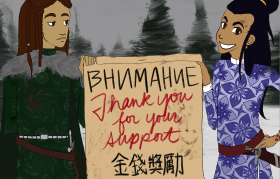
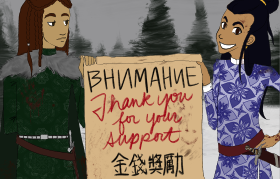
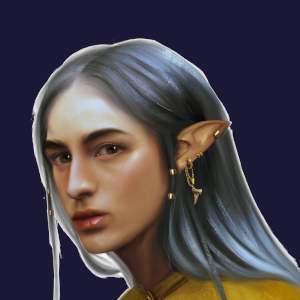
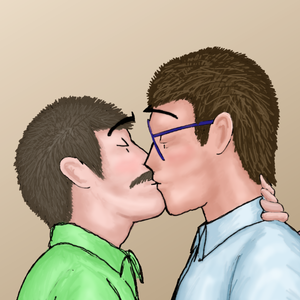







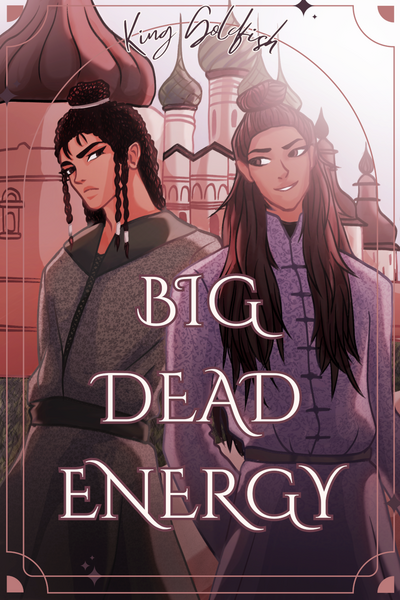
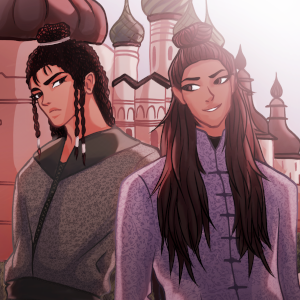
Comments (4)
See all